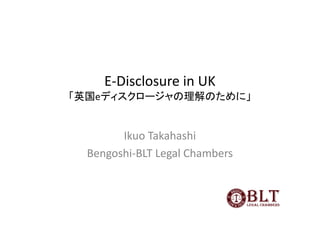Ikuoedisclosure Uk
- 1. E-Disclosure in UK ĄļÓĒđúeĨĮĨĢĨđĨŊĨíĐ`ĨļĨãĪÎĀí―âĪÎĪŋĪáĪËĄđ Ikuo Takahashi Bengoshi-BLT Legal Chambers
- 2. Structure of Litigation ÔVÔAĪÎÔė Truth No Jury -Civil evidence evidence
- 3. Common Law Country (Comparison of basic concept) ? Ą°Cards face up on the ? Civil Procedure Law in tableĄą Japan ĻC Ą°In plain language, ĻC No automatic discovery litigation in this country ĄŊ ? No exchange of list of cards face up on the documents. tableĄŊ(..)It is design to do ? Interrogatory is nor so real justice(..)Ąą Sir John popular. Donaldson M.R.in Davis v ? Requesting party should Eli Lily & co.[1987] specify the documents. ĻC Ą°There shall be full ĻC Broad exceptions disclosure of all evidence ĻC Misunderstanding ĻC material and necessary in Adversarial system(ĩąĘÂÕß the prosecution or defense ÖũÁx) of actionĄą(CPLR3101(a)) ĻC Ą°wild west shootingĄą
- 4. Legal issues ? e-disclosure ĻC Effective to data all over the world ? ? Difference of Civil Procedure law ? Conflict ? Japanese companies ĻC Not accustomed to e-discovery ? Many weak points
- 5. Effective to data all over the world(?) ? Strauss v. Credit Lyonnais SA,242 F.R.D 199(E.D.N.Y 2007) ĻC Judge Kiyo Matsumoto ? ĄąLawyers are now responsible for litigation without borders and discovery without language barriers.Ąą
- 6. Difference of Civil Procedure law-- Broad protection Ą°for private useĄą ? CPL Article 220 ? Ą°RingiĄą document is (Obligation to Submit usually protected from Document) production ? Protection ĻC (d) A document prepared exclusively for use by the holder thereof (excluding a document held by the State or a local public entity, which is used by a public officer for an organizational purpose).
- 7. Conflict of Civil procedure ? Data protection ĻC Online review ĄąTransferĄą or not ? Hague Convention ĻC Hague Convention(CP 1954 ,service 1965,Evidence 1971 (Japan x) more) ? Exclusive or not ? Sovereign ĻC Marc Rich ? Blocking Statute ĻC France, UK, China, Australia, South Africa ĻC MAAF case ? French lawyer was sentenced guilty to pay Ten Thousand Euros- Obstructing Justice ĻC Cour de Cassation Chambre Criminelle [Cass. Crim.], Paris, Dec. 12, 2007, Juris-Data no. 2007-332254
- 8. Not accustomed to e-discovery ? Many weak points ĻC Retention policy does not develop so well ? JP-No discovery rule as US ? Cannot respond litigation hold so well ĻC Cultural(?) points ? Do not know how rigid e-discovery rule. ĻC Erase private e-mails ? Japanese Executives do not like depositions. ? Prefer settlement-ĄąCooperation cultureĄą. Do not strategic perspective ĻC not early case assessment ? No systematic information cooperation between IT department and Legal department ? Japanese people like to take notes. write unnecessary personal impression.
- 9. E-Discovery reference Model ĢĻEĨĮĨĢĨđĨŦĨÐĨęēÎÕÕĨâĨĮĨë) Process Āí preser vation ąĢČŦ Information Identifica Produc presen management tion Review tion tation ĮéóđÜĀí ŨRe ĨėĨÓĨåĐ` ĨŨĨėĨž Ėáģö Collect Ĩó ion §žŊ Analysis ·ÖÎö
- 10. Differences between US and UK ? Scope? ? Procedure ? ? Decisions?
- 11. References ? Sedona WG6 Ą°Framework for Analysis of Cross-Border Discovery Conflicts: A Practical Guide to Navigating the Competing Currents of International Data Privacy and e- DiscoveryĄą ĻC http://www.thesedonaconference.org/content/mi scFiles/publications_html?grp=wgs160
- 12. One more thing
- 13. BLT legal Chambers ? Team BLT ĻC Younger lawyers for digital ages ĻC Team of resident lawyers & contract lawyers ? Primera Dougenzaka614 ? 1-15-3,Dougenzaka Shibuya,Tokyo ? ikuo@comit.jp ? Facebook


![Common Law Country
(Comparison of basic concept)
? Ą°Cards face up on the ? Civil Procedure Law in
tableĄą Japan
ĻC Ą°In plain language, ĻC No automatic discovery
litigation in this country ĄŊ ? No exchange of list of
cards face up on the documents.
tableĄŊ(..)It is design to do ? Interrogatory is nor so
real justice(..)Ąą Sir John popular.
Donaldson M.R.in Davis v ? Requesting party should
Eli Lily & co.[1987] specify the documents.
ĻC Ą°There shall be full ĻC Broad exceptions
disclosure of all evidence ĻC Misunderstanding ĻC
material and necessary in Adversarial system(ĩąĘÂÕß
the prosecution or defense ÖũÁx)
of actionĄą(CPLR3101(a)) ĻC Ą°wild west shootingĄą](https://image.slidesharecdn.com/ikuoedisclosureuk-13412765035082-phpapp01-120702200733-phpapp01/85/Ikuoedisclosure-Uk-3-320.jpg)



![Conflict of Civil procedure
? Data protection
ĻC Online review ĄąTransferĄą or not
? Hague Convention
ĻC Hague Convention(CP 1954 ,service 1965,Evidence 1971 (Japan x)
more)
? Exclusive or not
? Sovereign
ĻC Marc Rich
? Blocking Statute
ĻC France, UK, China, Australia, South Africa
ĻC MAAF case
? French lawyer was sentenced guilty to pay Ten Thousand Euros-
Obstructing Justice
ĻC Cour de Cassation Chambre Criminelle [Cass. Crim.], Paris, Dec.
12, 2007, Juris-Data no. 2007-332254](https://image.slidesharecdn.com/ikuoedisclosureuk-13412765035082-phpapp01-120702200733-phpapp01/85/Ikuoedisclosure-Uk-7-320.jpg)





